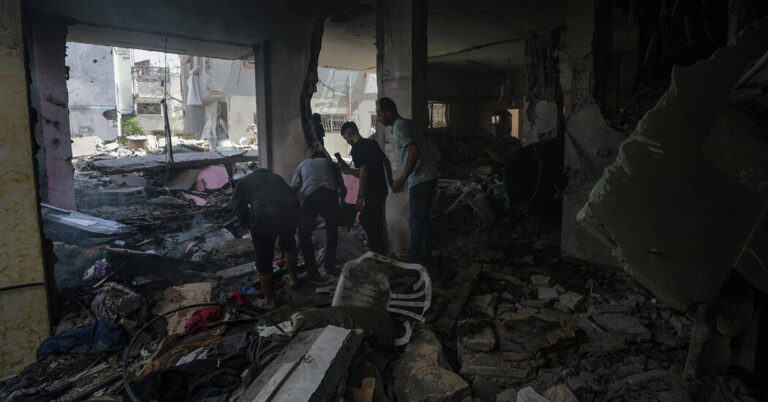The International Court of Justice decided Tuesday not to order Germany to stop supplying arms to Israel, issuing a provisional ruling in response to a request from Nicaragua.
The judges’ decision concerned a case brought by Nicaragua against Germany with potentially significant implications for whether providers of military aid to Israel share some responsibility for how the weapons are used.
In its case, Nicaragua argued that Germany is facilitating the commission of genocide in Gaza and violating the Genocide Convention by providing Israel with military and financial aid. He had asked the ICJ, the United Nations’ highest court, to issue an emergency order for Germany to stop supplying weapons to Israel and ensure that those already supplied are not used illegally. On Tuesday, the judges refused.
Appearing before judges in early April, Nicaragua, a longtime supporter of the Palestinian cause, told the court that Germany was not only failing in its obligations to help prevent genocide against Palestinians in Gaza, but that it also facilitated crimes with its military aid. Germany is a staunch ally of Israel and second only to the United States in providing military assistance.
The German Foreign Ministry welcomed the court’s decision.
“Germany is not a party to the conflict in the Middle East, quite the contrary: we are working day and night for a two-state solution,” he said in a statement posted on social media. Adding that Germany was also working to ensure that humanitarian aid reached Gazans, the ministry said Hamas was responsible for triggering a “spiral of suffering” in the region, against which it said Israel had the upper hand. right to defend oneself.
Germany and Nicaragua are both parties to the 1948 Genocide Convention, which requires them to act to prevent genocide, defined as the intent to destroy a group not only by killing or causing serious bodily harm or mentally, but also by inflicting “calculated living conditions” on him. to cause its physical destruction in whole or in part.
Israel has repeatedly denied accusations that it committed genocide in Gaza, arguing that its army worked to preserve civilian life and that Hamas used civilians as human shields.
Earlier this year, the ICJ issued separate interim orders requested by South Africa, specifying that Israel must prevent its forces in Gaza from taking measures prohibited by the Genocide Convention, must prevent and punish public statements that constitute incitement to genocide and must allow greater access to humanitarian aid. The judges also called for the immediate release of all hostages still held by Hamas.
The court is expected to take at least two years to rule on whether Israel committed genocide, but found a “plausible“risk of genocide.
Germany has strongly rejected arguments that it violated international law with its military exports to Israel, saying such shipments were still permitted under German and EU rules.
Unlike Germany, which gave the Court full jurisdiction, the United States protected itself and must consent to a case on most issues. He further protected himself from the Genocide Convention, signing the convention but exempting himself from any obligations, such as intervening to end a genocide or paying reparations if he was found to be complicit.
Critics of the Nicaraguan government say the prosecution of Germany for violating international law is hypocritical: A recent UN report accused Nicaragua of “systematic human rights violations” and increasing repression of government opponents in its country.
Erika Salomon reports contributed.


